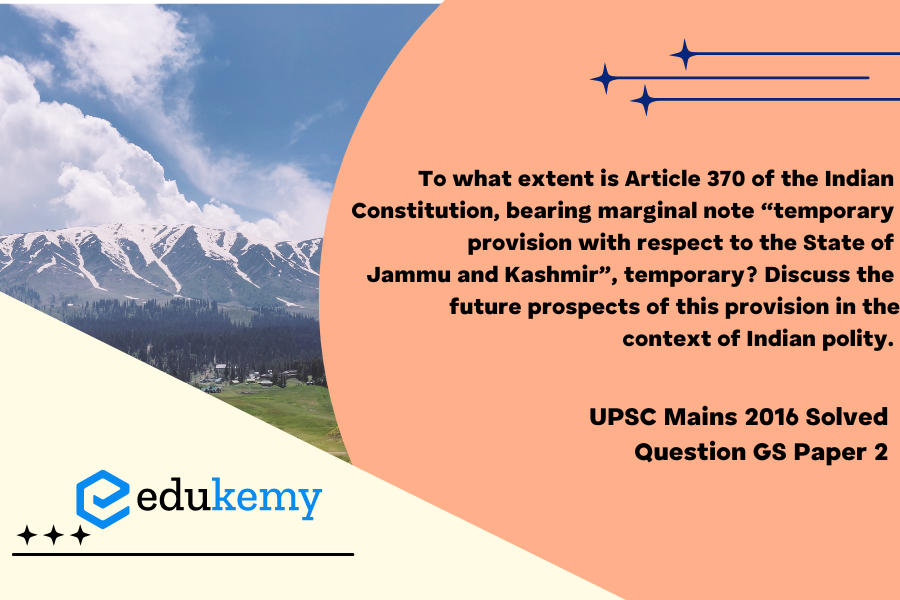Article 370 of the Indian Constitution, titled “Temporary provisions concerning the State of Jammu and Kashmir,” has long been a subject of debate and scrutiny in the realm of Indian polity. Enshrined as a temporary provision, its unique status has fueled discussions on its duration and relevance. The constitutional framers intended it to provide special autonomy to the state of Jammu and Kashmir, granting it a distinctive position within the Indian Union. However, the term “temporary” in the marginal note has led to questions regarding the longevity of this provision. Over the years, attempts have been made to abrogate or modify Article 370, raising concerns about its permanence. The discussions around its prospects in the context of Indian polity are multifaceted, considering political, legal, and historical dimensions. The evolving dynamics of the region and the changing landscape of Indian politics further add complexity to the analysis. As the nation navigates through its democratic journey, the fate of Article 370 remains uncertain, with implications for the socio-political fabric of Jammu and Kashmir and the broader Indian constitutional framework.
Tag: Indian Constitution—historical underpinnings, evolution, features, amendments, significant provisions, and basic structure.
Contents
Decoding the Question:
- In the Introduction, briefly write about Article 370.
- In Body,
- Discuss the temporary nature of Article 370.
- Mention the significance of Article 370 and write its future prospects.
- In Conclusion, try to suggest a way forward.
Answer:
Under the ‘Instrument of Accession’ signed by Maharaja Hari Singh, Jammu and Kashmir transferred “Defense, Foreign affairs and Communications” to India. The Indian government had committed to permit the Constituent Assembly of the state to determine the nature and subjects that would be transferred to India. To incorporate this special provision Article 370 was provided as an interim arrangement. It clearly recognized this as temporary. However, even after the State Constituent Assembly in 1954 has recognized the accession, Article 370 has remained in continuation due to historical and peculiar circumstances.
Article 370 of the Indian Constitution grants special autonomous status to Jammu and Kashmir, which exempts J&K from the Indian Constitution (except Article 1 and Article 370 itself) and permits the State to draft its own Constitution. It also restricts Parliament’s legislative powers in respect of J&K; it can make laws only on limited subjects: external affairs, defense, communication, and ancillary matters.

Article 370 as a Temporary Provision:
- The Part XXI of the Constitution is devoted to the ‘Temporary, Transitional and Special Provisions’. It deals with the special powers for the various states along with J&K. Article 370 makes Article 1 and Article 370 itself applicable to the State of J&K at once and authorizes the President to extend other Articles to the State. Another interpretation was that accession was temporary until a plebiscite.
- The Delhi High Court in Kumari Vijayalakshmi (2017) said that Article 370 is temporary and its continuation is a fraud on the Constitution. But in its other judgment, the Supreme Court refused to accept Article 370 as temporary.
Future Prospects of Article 370:
- Article 370 has been described as a tunnel through which the Constitution is applied to J&K; it is a bedrock of the Constitutional relationship between Jammu and Kashmir and the rest of India.
- This provision was incorporated in the Constitution as a means for providing the State a breather in the matters of governance and also making the state equipped before it gets integrated a part of India.
Article 370 reflects the terms of the instrument of accession executed by the sovereign ruler of Jammu and Kashmir in favor of India. It is often argued that its revocation would be consistent with the principles of Indian federalism. Any unilateral attempt to alter the provision strikes not just Kashmir but federalism because political sovereignty in India is shared between the union and its states. It requires a larger debate, including political parties, intelligentsia, civil society at large, and the people of J&K.
Note: In August 2019, the President of India exercised his powers conferred by Clause (1) of Article 370 of the Constitution issued the Constitution (Application to Jammu and Kashmir) Order, 2019, and made modifications to Article 370 and altered the relationship between the State of Jammu and Kashmir and the Indian Union.
In case you still have your doubts, contact us on 9811333901.
For UPSC Prelims Resources, Click here
For Daily Updates and Study Material:
Join our Telegram Channel – Edukemy for IAS
- 1. Learn through Videos – here
- 2. Be Exam Ready by Practicing Daily MCQs – here
- 3. Daily Newsletter – Get all your Current Affairs Covered – here
- 4. Mains Answer Writing Practice – here


